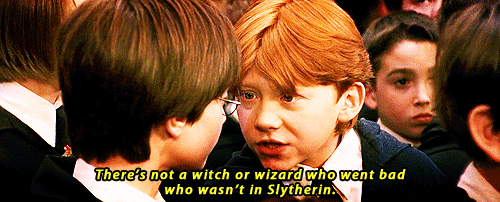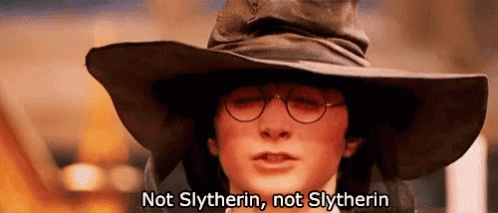The Sorting Hat Is Inherently Biased
While competition between Hogwarts Houses can be fierce, the Sorting Hat appears to serve as a neutral party, uninfluenced by petty rivalries, seeking only to put each student where they are most likely to excel. However, not being human does not automatically make the Hat impartial. It is conscious, sentient, and carries a thousand years of experience, making it just as capable of harboring bias. Furthermore, this bias makes the Hat culpable in creating a segregated and polarized environment through its prejudiced Sorting process. As it explains in Harry Potter and the Goblet of Fire, the Hat belonged to Gryffindor. Although the founders enchanted it together, it is still aware of its origin. Might it therefore have a sense of loyalty to its original owner and a grudge against the one he quarreled with?
Both characters and readers have noticed that Slytherin House appears to be full of evil wizards who believe in blood supremacy. Why does every single Death Eater, aside from Peter Pettigrew, and every Death Eater’s child seem to be a Slytherin? If the House is truly meant to be for those who possess ambition and cunning, putting aside Salazar’s own bigotry in wanting pure-bloods, why have there not been more Muggle-borns, Aurors, or members of Dumbledore’s Army or the Order of the Phoenix? Surely there are high-ranking Ministry officials, athletes, business owners, and other prominent, successful wizards who have been goal-oriented and strategic. Whatever Slytherin’s own views, the Hat has been responsible for Sorting for far longer than the founders were alive. By Harry’s time, even Voldemort’s, it is understandable that no one but blood supremacists wants to be in Slytherin when it has become so closely associated with the Dark Arts over the past thousand years.
Although the Hat’s first song portrays all four Houses in a positive light, its later songs betray its true feelings. It speaks of general discord among the founders in Harry Potter and the Order of the Phoenix but makes clear that “the fighting then died out” once “old Slytherin departed” (OotP 206). Still, the Hat does not celebrate Slytherin’s departure but mourns it, lamenting the fact that the Houses were never again united as they were meant to be. The Hat feels abandoned by one of its own creators and resentful of the fact that Slytherin retreated rather than reconciling with his friends.
The Hat feels complicit in sowing division just by virtue of splitting students up at all but evades responsibility by saying it is “condemned” to do so (OotP 206). It may be required to divide the students, but it has the power to make choices in how to do so and continues to do it in a way that maligns Slytherin. Time and time again, the Hat puts kids from pure-blood families with Death Eater ties into Slytherin. It is almost as though every time the Hat encounters such a child, no matter their other qualities, it thinks, “Ugh, you can go with that traitor.” And every time it senses an ambitious young Muggle-born or so-called blood traitor, it goes, “Nah, you don’t want to be with the icky snakes. I’ll put you somewhere nicer.” Hermione’s ambition and cunning have been well noted, but Slytherin never seems to even be a possibility for her. Harry is the exception, but the Hat only wants to put him in Slytherin because of the piece of Voldemort inside him.
If the Hat could see the bravery in Neville and convince him that he belonged in Gryffindor, despite his protests, surely it could also sense cleverness or loyalty or courage in a child of blood supremacists, even if that 11-year-old currently shares their parents’ prejudices. Perhaps spreading such children out would lead to them losing those prejudices and to Slytherin House no longer being a bastion of discrimination and Dark Magic. Instead, the Hat creates a little club where they are all concentrated rather than giving them the opportunity to be exposed to more diversity and encouraged to foster the qualities valued by another House. Slytherins have developed a self-perpetuating reputation that is enabled by the Sorting Hat.
It sometimes seems as though the Hat wants to punish Slytherin by ensuring that his legacy is just as terrible as he was. A thousand years later, the name remains synonymous with hatred of Muggles. Salazar’s intolerant views and actions should not be forgotten or dismissed, particularly when wizards continue to follow in his footsteps, but the Hat had the chance to create a positive environment that could have quashed such idolatry, a place where even Slytherin’s heirs would not have wanted to release a monster to kill Muggle-borns.
There are arguments in favor of renaming or dissolving Slytherin House or abolishing Sorting entirely, but in the meantime, the one entity with the power to reform the system is the Sorting Hat itself. Perhaps instead of spending all year in the headmaster’s office coming up with a new song, it should use that time to examine its own biases and reevaluate its methodology.





